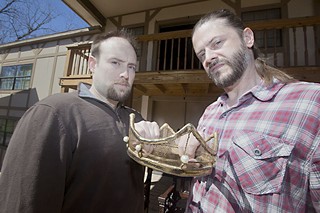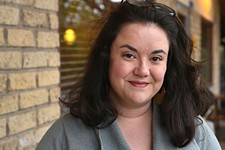The Flip Side
In Poor Shadows of Elysium's 'Richard II,' a coin makes all the difference in what you see
By Jillian Owens, Fri., Feb. 22, 2013
The stars of Poor Shadows of Elysium's production of Richard II couldn't be better foils. Kevin Gates is lanky and mousy-haired, a sort of gentle-looking guy. Aaron Black, on the other hand, is brawny and dark and brooding. Gates' first acting experience was as a character named Mr. Tall in a first-grade play. "I walked out onstage, and I had one line of dialogue that I said, and the entire place erupted in laughter," he remembers. Tellingly, Black also debuted at a young age: He played the Grumpy Elf who lost the spirit of Christmas. He jokes, "I remember not being very pleased with the verisimilitude, or lack thereof, of some of the other first graders."
In any other production of this Shakespearean history, Gates would almost certainly play ineffectual King Richard opposite Black as Henry Bolingbroke, the bellicose nobleman who deposes the monarch. They're two sides of the same coin: powerful, reciprocal characters set against each other in their actions, motivations, and speech – kind of like the 14th century version of Regina George and Cady Heron. Heads roll and tears are shed as Richard and Bolingbroke vie to chart the course of England's history. (If you caught last summer's Rose Rage by Hidden Room Theatre, you know that Henry's actions have disastrous consequences a century later.)
Now here's the rub: In this Richard II, Gates and Black have memorized and rehearsed both roles – slightly fewer lines than Hamlet. The cast has prepared what are essentially two different plays, with different interpretations, depending on who's playing Richard. But unlike John Barton's 1973 Royal Shakespeare Company production, in which two actors alternated the roles in successive performances, these poor shadows are at the mercy of a coin. Just moments before each performance, a coin flip will decide who plays the usurper and who the usurped. The instant after the flip, Gates anticipates, will be a "magical" one: "The audience gets to see the actors go from being sort of neutral to the characters they're going to occupy for the rest of the evening. They get to watch us becoming the characters." Black, who received his MFA from the New School for Drama/the Actors Studio in New York, says he worries about that transition. "Essentially you have to prepare for both and figure out something that will immediately trigger you for that and hope it works. I don't really have any proof at this point that it will work. That was part of the reason I accepted and wanted to do this."
The flip might seem like a gimmick to convince Austin audiences to drive out past Mopac and 360 to Richard Garriott's Curtain Theatre for a two-hour-plus obscure history play performed by a new company. "It's a shtick," concedes director Christina Gutierrez. "But it makes sense. It's a choice." Gutierrez, a Ph.D. student in the Performance as Public Practice program at the University of Texas, argues that the flip will illuminate the play's pivotal theme of chance. "Everything seems stacked in really random circumstances. That is a difficult thing to communicate to an audience. The advantage of the coin toss is that things can happen that randomly, and things as big as who is the king is chance.
"I think it's a great debut for a new company. We're doing something incredibly intricate and new. Shakespeare happens in this town, but this has never been done [here], as far as I know."
This recent addition to Austin's already impressive roster of theatre companies was founded last year by Gates and Bridget Farias, artistic director of Wimberley's EmilyAnn Theatre, as a text-based company dedicated to Renaissance works. The name Poor Shadows of Elysium references Shakespeare's Cymbeline: that whopper of a speech in which Jupiter descends on an eagle to chide the ghosts of Posthumus' family for their weak faith. For Gates, the phrase conjures "the idea of the poor players." He explains: "We're all doing theatre on a shoestring in this town. We're all poor shadows. We're all just doing the best we can to pull things together, to make it happen, and somehow, things always seem to work out. In a way, it's kind of a prayer: 'O God, please let this shit come together!'"
But these folks are more on top of it than Gates will lead you to believe. Not only will they perform in the Curtain, Garriott's scaled homage to an Elizabethan theatre, but they also have Abilene Christian University assistant professor of English Joe Stephenson on board as dramaturg. The cast includes accomplished local actors including Suzanne Balling, Travis Bedard, and Stephen Price, who is returning to the stage as the Duke of York after a 20-year hiatus. Price comments that, though rehearsing with different Richards and Bolingbrokes was confusing at first, he feels confident in the dual versions of the play that the cast has developed. "I've found rich variations in the text," he says, to create "different reactions with the same words." According to Price, a conscientious focus on language is particularly important in this production. "That's the way you do it. If you've got Shakespeare's language, you're halfway there."
The deliberate connection of the coin flip and Shakespeare's words is just one aspect of Poor Shadows' text-based approach. Gutierrez, after dramaturging for most of her professional life, donned the director's cap last summer for the Jacobean incest tragedy 'Tis Pity She's a Whore for 7 Towers Theatre Company, which she and Black run together. The switch, she says, "has made me focus on text in a way that I don't know that a lot of Shakespeare directors do." And both Gates and Black have devised elaborate notation schemes to mark meter, rhyming couplets, and other structural oddities in the play, which is the only one of Shakespeare's written entirely in blank verse. The actors emphasize that this meticulous attention will feed directly into their performances. "I made some bold choices early on about my interpretation of Bolingbroke's motives based on several of his speeches that are highly irregular," explains Gates. "As I was reading it, I was looking at how the verse was structured, and I was like, 'You are lying. You're lying. You are a lying bastard!'"
Verse coach David Boss, who plays Mowbray, also works with cast members individually on the text. He hopes that Richard II will be "a virtuosic example of how we're supposed to convey Shakespeare's language. We are given a template, and this entire play exists in that. It's one long poem. We have the opportunity to show off Shakespeare's verse in a way that few other companies do." The cast and production team agree that their thoroughness sets them apart. But they also maintain that the coin toss is what will make this Richard II great. "It forces this cast to be more present," says Gutierrez. "These are all fantastic actors, but the degree to which they have to be present and listening on any given night is ratcheted up much more than it normally is. I think that this audience is going to get to see not necessarily better performances, but more engaged performances."
Richard II runs Feb. 21-March 9, Thursday-Saturday, 8pm, at the Curtain Theatre, 7400 Coldwater Canyon. For more information, visit www.poorshadows.com.












